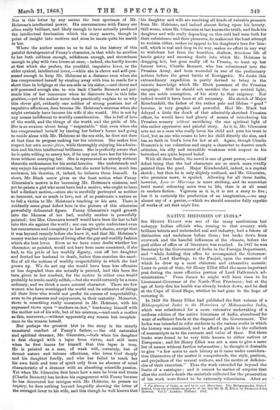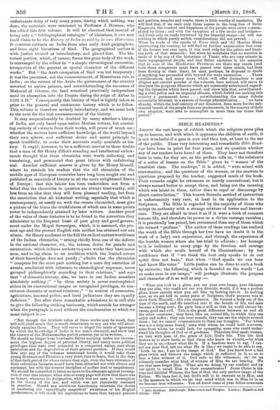NATIVE HISTORIES OF INDIA.*
SIR HENRY ELLIOT was one of the many meritorious but unhappy Indian officials who, coming to that country with brilliant talents and unbounded zeal and industry, had a future of distinction and usefulness before them ; but broke down from overwork and the baneful influences of the climate, before the goal either of office or of literature was reached. In 1847 he was Secretary to the Government of India in the Foreign Department, and " while holding this office he accompanied the Governor- General, Lord Hardinge, to the Punjab, upon the resources of which he drew up a most elaborate and exhaustive memoir. Later in point of time, Sir Henry Elliot filled the same important post during the more effective portion of Lord Dalhousie's ad- ministration." From thence he might well have risen to be Lieutenant-Governor of the North-West Provinces ; but at the age of forty-five his health was already broken down, and he died at the Cape of Good Hope, whither he had gone in the hope of restoring it.
In 1849 Sir Henry Elliot had published the first volume of a Bibliographical Index to the Historians of Mohammedan India, which was substituted for a more extensive undertaking of a uniform edition of the native historians of India, abandoned for want of sufficient funds at the disposal of the Government. The Index was intended to refer students to the various works in which the history was contained, and to afford a guide to the collectors of manuscripts as to the contents and value of these. But these books were found to be very little known to either natives or Europeans ; and Sir Henry Elliot was not a man to give a mere list of names without further information ; he thought it desirable to give " a few notes to each history as it came under considera- tion illustrative of the matter it comprehends, the style, position, and prejudices of the several authors, and the merits or deficien- cies of their execution." Thus the work extended far beyond the limits of a catalogue ; and it cannot be matter of surprise that after the author's death the materials collected for the prosecution of his work were found to be extremely voluminous. After an
The History of India, as told by its own Historians. The Muhammadan Period Edited, from the posthumous papers of the late Sir H. IL Elliot, by Professor John Howson. Vol. I. London: Trlibner. 1867. unfortunate delay of very many years, during which nothing was done, the materials were entrusted to Professor J. Dowson, who has edited this first volume. It will be observed that instead of being only a " bibliographical catalogue " of historians, it can now itself claim to be the History of India as told by its own Historians. It contains extracts on India from nine early Arab geographers, and from eight historians of Sind. The geographical section is with justice treated as introductory, and placed first. The his- torical portion, which, of course, forms the great body of the work, is rearranged by the editor in " a simple chronological succession, irrespective of the general or special character of the different works." But " the Arab occupation of Sind was but temporary ; it was the precursor, not the commencement, of Mussulman rule in India ; on the retreat of the Arabs the government of the country reverted to native princes, and notwithstanding the successes of Mahmud of Ghazne, the land remained practically independent until its absorption into the Empire during the reign of Akbar in 1592 A.D." Consequently this history of Sind is rightly taken as prior to the general and continuous history which is to follow. This volume is therefore entirely introductory, and we must look to the next for the real commencement of the history.
It may unquestionably be doubted by many whether a history of India, not only based upon native Moslem writers, but consist- ing entirely of extracts from their works, will prove of much use ; whether the writers have sufficient knowledge of the world beyond their own sphere, and sufficient desire and moral principle to speak truthfully, to make their accounts really available as his- tory. It ought, however, to be a sufficient answer to these doubts that a man of Sir Henry Elliot's standing and intellectual endow- ments thought that these chronicles were worth collecting and translating, and prosecuted that great labour with unfaltering seal. Another sufficient answer is given by Sir Henry himself, where he reminds his readers that the old chronicles of the middle ages of European countries have long been sought out and published as materials of history in all the more enlightened States of Europe ; that this labour has been undertaken not from a belief that the chronicles in question are always trustworthy, still less from an idea that they will form pleasant reading, but from the conviction that all historical writing, especially that which is contemporary, or nearly so, with the events chronicled, must give a picture of the times the truthfulness of which can in some points never be independently attained by later writers. Another proof of the value of these histories is to be found in the correction they administer to the frequent boast of past glory and good govern- ment under the Mogul Sovereigns, which, it is assumed, the pre- sent age and the present English rule neither has attained nor can attain. Sir Henry confesses to the full the radical untrustworthiness of the Indian chronicles, " arising chiefly from one of the defects in the national character, viz., the intense desire for parade and ostentation, which induces authors to quote works they have never seen, and to lay claim to an erudition which the limited extent of their knowledge does not justify ;" admits that the chronicles 4' comprise for the most part nothing but a mere dry narration of events, conducted with reference to chronological sequence, never grouped philosophically according to their relations," and says that "of domestic history, also, we have in our Indian annalists absolutely nothing ;" " by them society is never contemplated either in its conventional usages or recognized privileges, its con- stituent elements or mutual relations ;" " in notices of commerce, agriculture, internal police, and local judicature they are equally deficient." But after these remarkable admissions he is still able to give the following striking testimony, which sounds far stronger when the paragraph is read without the condensation to which we must subject it :—
"Bat though the intrinsic value of these works may be small, they will still yield much that is worth observation to any one who will atten- tively examine them. They will servo to dispel the mists of ignorance by which the knowledge of India is too much obscured, and show that
the history of the Muhammadan period remains yet to be written We should no longer hear bombastic Babas enjoying under our Govern- ment the highest degree of personal liberty, and many more political privileges than were ever conceded to a conquered nation, rant about patriotism and the degradation of their present position. If they would dive into any of the volumes mentioned herein, it would take these young Brntuses and Phociona a very short time to learn, that in the days of that dark period for whose return they sigh, even the bare utterance of their ridiculous fantasies would have been attended not with silence and contempt, but with the severer discipline of molten lead or empalement. We should be compelled to listen no more to the clamours against resump- tion of rent-free tenures, when almost every page will show that there was no tenure, whatever its designation, which was not open to resumption in the theory of the law, and which was not repeatedly resumed In practice. Should any ambitions functionary entertain the desire of emulating the exceedingly magnifical' structures of his Moghul predecessors, it will check his aspirations to learn that, beyond palaces and porticos, temples and tombs, there is little worthy of emulation. He will find that, if we omit only three names in the long line of Delhi Emperors, the comfort and happiness of the people were never contem- plated by them ; and with the exception of a few sarais and bridges— and these only on roads traversed by the imperial camps—he will see nothing in which purely selfish considerations did not prevail When he reads of the canals of Firoz Shah and 'Ali Mardin Khan intersecting the country, he will find on further examination that even if the former was ever open, it was used only for the palace and hunt- ing park of that monarch ; but when he ascertains that no mention is made of it by any of the historians of Timtir, who are very minute in their topographical details, and that Babar exclaims in his memoirs that in none of the Hindustani Provinces are there any canals (and both these conquerors must have passed over these canals, had they been flowing in their time), he may, perhaps, be disposed to doubt if anything was proceeded with beyond the mere excavation.. . . These considerations, and many more which will offer themselves to any diligent and careful peruser of the volumes here noticed, will serve to dissipate the gorgeous illusions which are commonly entertained regard- ing the dynasties which have passed, and show him that, notwithstand- ing a civil policy and an ungenial climate, which forbid our making this country a permanent home . . . notwithstanding the many defects necessarily inherent in a system of foreign administration . . . we have already, within the half-century of our dominion, done more for the sub- stantial benefit of the people than our predecessors, in the country of their own adoption, were able to accomplish in more than ten times that period."































 Previous page
Previous page